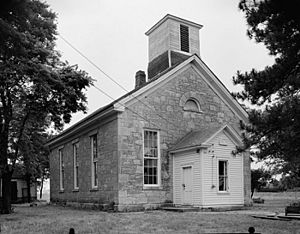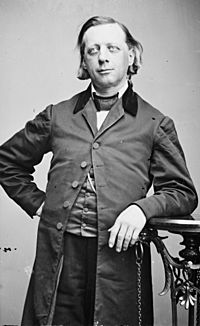Beecher's Bibles facts for kids
"Beecher's Bibles" was a special name given to Sharps rifles. These were powerful breech-loading rifles. They were used by settlers who were against slavery in Kansas. This happened during a tough time called Bleeding Kansas (1854–1860).
The Sharps Model 1853 rifles were sent in crates. These crates were secretly marked "Books and Bibles." In 1856, a newspaper article quoted Henry Ward Beecher. He was a famous minister. After this, the Sharps rifles became known as Beecher's Bibles.
Why They Were Called Beecher's Bibles
For many years, there was a big fight in America. People disagreed about whether slavery should be allowed. Before Missouri joined the United States, there were 11 free states and 11 slave states. Free states did not allow slavery. Slave states did.
In 1820, the Missouri Compromise tried to solve this. It said that new states south of Missouri could be slave states. But in 1854, the Kansas–Nebraska Act changed things. It said voters in each new territory could decide for themselves.
This led to many settlers moving to Kansas. Some wanted slavery, and some did not. There was a lot of fighting and violence. This period became known as "Bleeding Kansas."
During this time, Minister Henry Ward Beecher helped. He raised money to buy rifles for the anti-slavery settlers. These rifles were the "Beecher's Bibles." Henry W. Beecher believed these weapons were more important than religious books for keeping peace. He thought they would help stop the violence.
The Sharps Carbine Rifles
The name "Beecher's Bibles" came from Henry Ward Beecher. He was an abolitionist minister from New England. Abolitionists were people who wanted to end slavery. Beecher worked with the New England Emigrant Aid Company.
In 1856, a newspaper wrote about Beecher. It said he raised money to buy weapons. These weapons were for the anti-slavery settlers in Kansas. Some newspapers started calling Beecher's church the "Bible and Rifle Company." Soon, the guns they bought became known as Beecher’s Bibles.
The way the guns were sent also helped the name stick. Abolitionists in New England sent Sharps Carbines to Kansas. They wanted to help the anti-slavery settlers. The carbines were hidden in crates. These crates were covered with actual bibles. The crates were marked "Books and Bibles" to hide their true contents.
The Sharps Carbines were very advanced for their time. They had a new "breech-loading" design. This meant they could be loaded faster from the back of the barrel. The specific model was the Sharps Model 1853.
Sending weapons to the territory was not allowed by the government. But this did not stop the abolitionists. They kept donating money to buy firearms. A doctor named Samuel Cabot gave $12,500 for the rifles. The New England Emigrant Aid Company also bought 100 rifles. About 900 Beecher's Bibles were used in the Kansas conflict.




